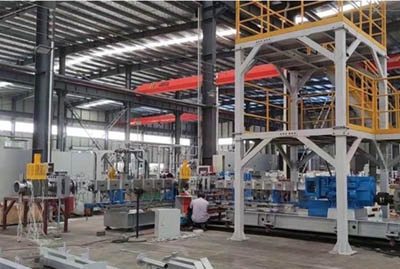Rubbintec and Polylema build rubber devulcanization plant in Kaunas, Lithuania
Washington, DC – Rubbintec Inc. and Polylema UAB are building a $8 million manufacturing plant that includes two rubber devulcanization production lines, a laboratory, and a tire shredding facility. The plant is being built in Lithuania at the Kaunas Free Economic Zone.
Phase 1 of the project, which will be operational in February 2022, comprises a twin-screw extruder line with a capacity of 7,000 tons per year (tpy). The plant will produce devulcanized rubber and TPE. Rubbintec’s launch customers include a roofing materials company. Phase 2 of the project will include a tire shredding facility and a 15,000 tpy line. The facility will also have a laboratory, which will enable Rubbintec to customize compounds for its customers. The financing for the plant came from private investors and government grants.
Kalin adds that the selling price is less than virgin rubber. Rubbintec/Polylema will also be producing asphalt modifiers that can substitute for SBS, at a lower cost.
Rubbintec’s technology is different from other devulcanization technologies due to its highly selective process in cleaving sulfur bonds. This innovative process also enables the production of TPE, with the feedstock comprised of devulcanized rubber and hard to recycle post- consumer and post-industrial waste plastic, including mixed plastics.
Rubbintec’s mission is to enable rubber to be truly part of the circular economy. Rubber product manufacturers and consumers, including tire manufacturers and automotive makers, are under increasing pressure to be more sustainable and to meet ESG mandates. Also, the need for alternatives to natural rubber are growing, given the increased possibility of shortages due to supply chain problems, disease and drought. By purchasing truly recycled rubber from a local devulcanization plant instead of importing 100% of their natural rubber requirements, natural rubber users can diversify their supply. And today, many consumers are demanding products made from sustainable and recycled materials instead of petroleum-based products. “It’s’ critical that we treat waste as a valuable resource”, says Marty Kalin Founder and CEO of Rubbintec. “Rubber is currently not part of the circular economy and there is no reason it shouldn’t be. If not now when?”
Until now, vulcanization has made rubber recycling technically more difficult than plastic and most other materials. Consequently, today, the waste processing route for more than two-thirds of the 1.5 billion end-of-life-tires (ELT) in most countries is still landfilling and incineration for energy recovery. Landfills are ideal breeding grounds for mosquitoes and are prone to fires and a waste of a valuable material. Other applications for ELT is downcycling. The fact is that there is very little upcycling of ELT.
Compared to other ELT waste pathways, devulcanization is the most sustainable solution to recycle rubber, manage end of life tires, and further the circular economy.
In the past, most devulcanization and reclamation technologies have failed because in addition to breaking the S-S bonds, the C-C and C-H bonds of the molecular chain are also broken, making the new polymer less desirable than virgin material. Rubbintec solved the technical problem with its innovative devulcanization approach. Recent test results at the independent testing lab ARDL, in Akron Ohio of one of its formulas shows a tensile strength of 2302 psi after its recovered polymer material has been vulcanized.
Rubbintec’s innovation is primarily chemical and secondarily mechanical. Waste rubber is placed in a twin-screw extruder, where the reaction takes place. The process is inexpensive, efficient, and easy to implement and doesn’t create any byproduct waste. Marty Kalin, Rubbintec’s CEO, is seeking rubber product manufacturers to test Rubbintec’s devulcanized material and investors for a North American plant. “Devulcanized material is less expensive than virgin rubber, but with comparable properties. And using sustainable, recycled material is not only the right thing to do but it’s good for business, because that’s what is in demand. It’s a win-win. There’s nothing to lose by testing our devulcanized material”, says Kalin.

